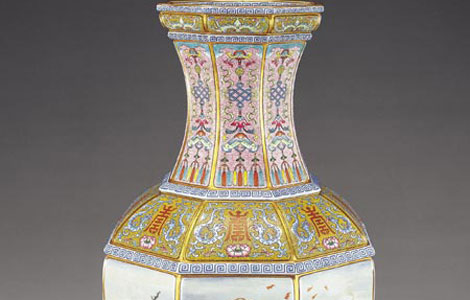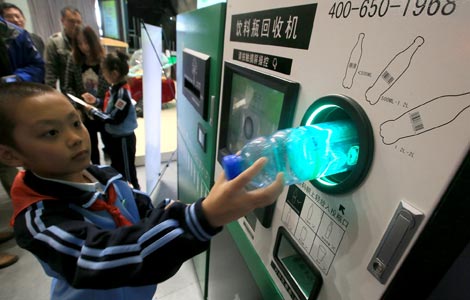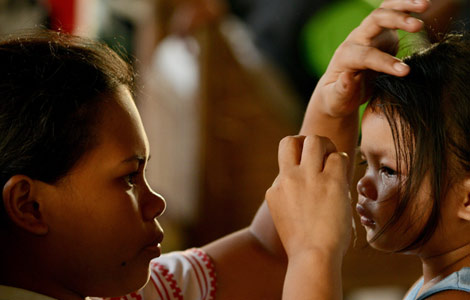Road map unveiled for profound reform
Updated: 2013-11-16 01:48
By ZHU ZHE (China Daily)
|
||||||||
Laojiao system to be abolished; Family planning policy to be loosened; Judicial independence to be pushed
The Party on Friday promised to push forward with profound reforms in coming years, stressing the rule of law is a necessity to achieve prosperity.
The reforms include the long-awaited decision to abolish the 56-year-old "re-education-through-labor" system as part of efforts to improve human rights protection.
They also feature a change to the court management system to make local courts free from government interference.
The grip will also be loosened on the family planning policy adopted more than 30 years ago.
Couples where either the husband or wife is a single child will be allowed to have two children, under a key reform decision released by the Communist Party of China Central Committee on Friday.
The decision on the reforms was approved by the Third Plenum of the CPC's 18th Central Committee, which ended on Tuesday, and the 22,000-word full-text document was released on Friday.
Experts said the decision can be viewed as a reform road map for China in the coming decade, and the measures proposed in the judicial sector will help establish an independent judicial system.
Explaining the key reform decisions to the CPC Central Committee members at the Third Plenum, Party chief Xi Jinping said decisions made at each third plenary session are highly important, as the public sees them as a new leadership's political agenda.
The current Party leadership was elected last year.
The system of "re-education through labor", or laojiao, has long been criticized. Under the system, introduced in 1957, a person could be held for up to three years without trial.
Under the reform decision, the country will abolish the system and improve laws covering correction and punishment for crimes.
Jiang Ming'an, a law professor at Peking University, said the decision means that wrongdoers usually placed in labor camps are more likely to face a court trial.
The decision also reiterates a strict ban on the extraction of confessions through torture and physical abuse, and states that lawyers will be granted a bigger role in protecting people's legal rights.
To ensure judicial independence, local courts and prosecutors below provincial level should have their personnel and property under unified management, according to the decision, which calls for a judicial jurisdiction system "relatively separate" from the administrative division.
Zhang Hengshan, a professor in the political and law research department at the Party School of the Central Committee of the CPC, said, "The decision requires administrative elements to be removed from courts and prosecuting bodies. This is a crucial reform to ensure judicial independence."
He said although it is unclear whether the top court or provincial courts will give financial support and appoint judges to local courts, it is clear that local courts will no longer depend on financing from the same level of government, which can effectively prevent interference.
In addition, the petition system will be reformed. Authorities must respond to and terminate cases within the legal framework, under the decision.
Petitioning, also known as letters and calls, is an administrative system for hearing public complaints. People who are not satisfied with government decisions can request that issues be re-examined. But after re-examination and review, matters are closed.
The termination procedure was sometimes abused by local authorities, resulting in cases being settled inappropriately. This led to public anger and some mass incidents.
Another notable reform policy in the document is the loosening of family planning policy to promote "long-term balanced development of the population".
China currently allows couples to have a second child if both husband and wife are only children.
Zhang, from the Party School, spoke highly of the policy document, saying it points the direction for reform.
He said the document can be considered of equal significance as the one adopted by the Third Plenum of the Party's 11th Central Committee held in 1978, which decided to adopt the reform and opening-up policy.
Cao Yin and Zhao Yinan contributed to this story.

 Chinese, US militaries practice disaster relief
Chinese, US militaries practice disaster relief
 3D light show displayed in Shanghai
3D light show displayed in Shanghai
 Nation's FDI in US getting more diverse
Nation's FDI in US getting more diverse
 Hit litterbugs with fines, not insults
Hit litterbugs with fines, not insults
 Wu Lei goal keeps alive China's hope in Asian Cup
Wu Lei goal keeps alive China's hope in Asian Cup
 US carrier starts Philippine storm relief
US carrier starts Philippine storm relief
 Treasures under the hammer
Treasures under the hammer
 'Reverse' vending machine sells idea of recycling
'Reverse' vending machine sells idea of recycling
Most Viewed
Editor's Picks

|

|

|

|

|

|
Today's Top News
Chinese, US militaries practice disaster relief
1 killed, 3 wounded at house party shooting in Houston
Obama: US poised to control own energy future
Wait a minute, baby
Map unveiled for profound reform
Typhoon death toll tops 3,621
House OKs health care plans
Chinese market to open wider
US Weekly

|

|






